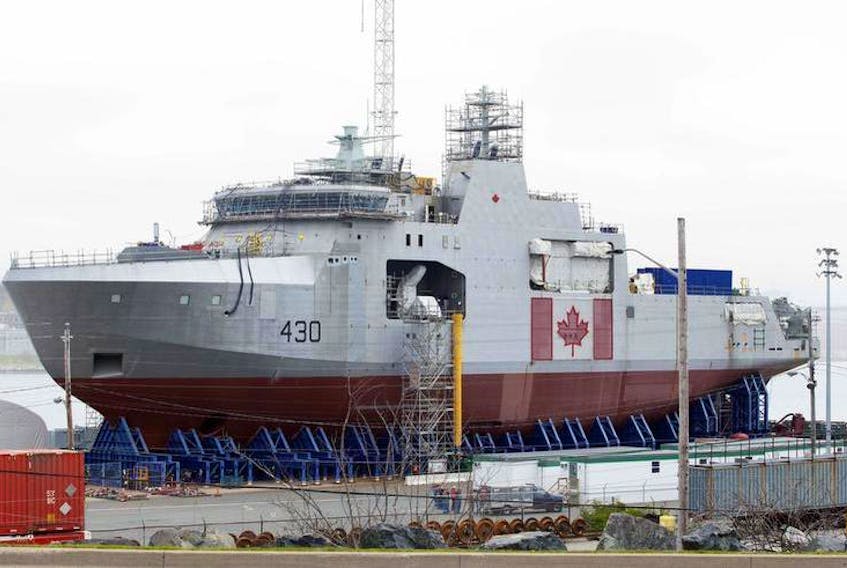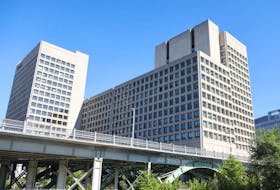The delivery of the first of six Arctic and Offshore Patrol vessels has been delayed again, but Ottawa says it won’t affect the project's overall timeline.
Irving Shipbuilding in Halifax is in the process of constructing six of the Harry DeWolf-class ice-breaking vessels for the Royal Canadian Navy, as part of its role as the prime contractor for the combat portion of the multi-billion-dollar National Shipbuilding Strategy, as well as two more for the Canadian Coast Guard.
The second vessel in the class, to be called HMCS Margaret Brooke once commissioned, was officially launched by Irving into the Bedford Basin over the weekend. But on Tuesday both Irving and the Department of National Defence confirmed delivery of the first fully finished AOPS, the future HMCS Harry DeWolf will be delayed until winter.
Due last summer, coming this winter
“When installing complex and integrated major ship systems such as the propulsion system, the sequencing of technical activities will offer challenges that can lead to rework and retrials.”
- DND spokesman Andrew McKelvey

The first anticipated delivery date for the lead ship in the Harry DeWolf-class was originally scheduled for 2018. It was then moved to summer 2019, and was later adjusted to the end of 2019.
DND spokesman Andrew McKelvey said that while there remains some uncertainty, delivery is now anticipated to take place "in the coming months."
Sean Lewis, Irving’s director of communications, said the shipyard is just weeks away from taking the future HMCS Harry DeWolf to sea for the first time, followed by formal sea trials and acceptance, a process that will stretch into the first quarter of 2020.
McKelvey said forecasting delivery of the first ship in its class ship is challenging.
“For the first AOPS, the delays to the schedule are in large part due to production challenges typically seen with a first of class build,” he said.”
“For example, when installing complex and integrated major ship systems such as the propulsion system, the sequencing of technical activities will offer challenges that can lead to rework and retrials.”
With the need to re-establish a supply chain, a new ship design, a new shipyard, and a new workforce, Lewis said there was always the intent to revisit lead ship dates throughout construction.
While the impact on the timeline for the deliveries of the other vessels is being assessed, McKelvey the expected delivery date for the sixth ship remains unchanged.
Lewis was also confident the delay would not impact the overall National Shipbuilding Strategy timeline.
“The overall AOPS program schedule will be completed as originally planned. The hard work over the past few years is paying off and we are experiencing significant ship over ship production efficiencies, which will continue through AOPS and into the Canadian Surface Combatant program,” Lewis said.
David Perry, a senior analyst and fellow at the Canadian Global Affairs Institute, said he is not surprised to see a divergence from the initial timeline for delivery, especially considering the growing pains associated with rebuilding an entire industry.
“The first-in-class issues are pretty common for most new designs, which this is, especially in new shipyards, which this is," Perry said.
In the water, but not in the books

The Harry DeWolf was launched back in September of 2018 -- a major milestone in the life cycle of a ship, it marks the first time the ship is moved from the building site to water, where work continues.
With the future HMCS Margaret Brooks now alongside her, DND says construction of the future Harry DeWolf is progressing with final production activities being completed along with initialization of systems. At the same time, various inspections, tests and trials are underway to ensure the ship meets technical design requirements and is ready to safely proceed to sea.
According to DND, Irving is planning to conduct formal sea trials in January 2020. After that, any remaining production work will be completed, along with fixing any issues noted during the inspection, test and trials program.
“Following reviews and final inspections by National Defence, the shipbuilder will present the ship for delivery,” McKelvey said.
After some final tweaks, McKelvey said Royal Canadian Navy will then assume full operational control of the ship later in 2020.
Four ships are currently in full production at the Halifax Shipyard, with a ship expected to be delivered approximately every year until all six have been delivered to the Royal Canadian Navy, McKelvey said. Additionally, two AOPS will be built for the Canadian Coast Guard immediately following those for the navy.
Once the AOPS are completed, Irving will begin work on a much larger and more complex build, the construction of 15 new warships for the navy.
This complexity, Perry said, will make it even more likely that there will be delays in the expected delivery date of the first Canadian Surface Combatant in the mid-2020s.
“I don't think that some extra time on the first AOPS is going to have any kind of consequential impact on (the Canadian Surface Combatant) as much as other things will, like finalizing requirements, reconciliation, getting the buildable design, doing the contract negotiations,” he said.
“There are all kinds of other bits that have to go forward relatively quickly and expeditiously and without problem to have the CSC move ahead on the timeline.”
RELATED:









